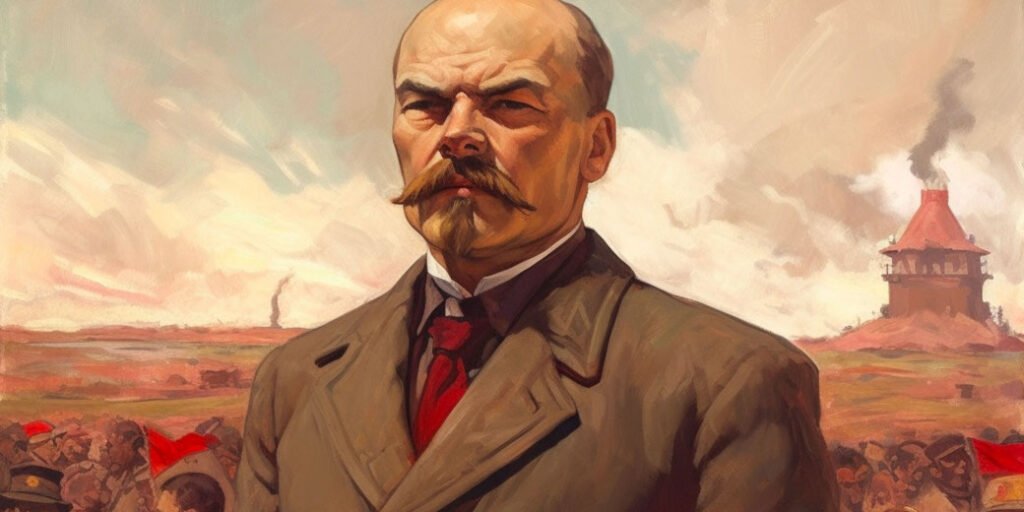
Vladimir Lenin: Architect of the Russian Revolution and the Soviet State
Early Life and Awakening:
Vladimir Lenin, born as Vladimir Ilich Ulyanov on April 22, 1870, in Simbirsk, Russian Empire (now Ulyanovsk), hailed from a family of educators. Tragedy struck early in his life when his father passed away when Lenin was just sixteen. This event deeply impacted him, leading him to renounce his faith in God and the Russian Orthodox Church. Following his older brother Sacha’s involvement in a revolutionary group, Lenin was thrust into the world of politics, marking the beginnings of his revolutionary journey.
Formative Years and Ideological Evolution:
Lenin’s pursuit of education took him to Kazan University, where he delved into political ideologies. Immersed in Marxist philosophy, he became a staunch believer in the principles of Karl Marx, envisioning it as the ideal form of governance. Despite facing obstacles, including expulsion from university, Lenin’s dedication to the revolutionary cause remained unwavering.
Exile, Revolution, and Political Triumph:
Exiled to Siberia in 1897, Lenin continued his revolutionary activities, eventually founding his own Marxist group, the Bolsheviks. His years in exile saw him authoring influential communist literature and meticulously planning the upcoming revolution. The outbreak of World War I in 1914, coupled with the harsh conditions faced by the Russian populace, set the stage for widespread discontent, paving the way for revolutionary fervor.
In 1917, the February Revolution led to the overthrow of the Tsarist regime, giving rise to the Provisional Government. Lenin, seizing the moment, returned to Russia from exile and vehemently criticized the new government, advocating for a regime governed by the people. In October of the same year, he spearheaded the Bolshevik Revolution, establishing the Russian Socialist Federative Soviet Republic, thus becoming its leader.
Challenges and Transformation:
Lenin’s leadership faced significant challenges, including a brutal civil war against anti-Bolshevik forces. Despite the harsh measures taken to suppress opposition, Lenin’s policies aimed to reshape the nation’s landscape. He implemented War Communism, centralizing control over resources during the civil war. Post-conflict, recognizing the need for economic recovery, Lenin introduced the New Economic Policy, allowing limited private ownership and capitalism, facilitating Russia’s economic revival.
Founding the Soviet Union and Legacy:
In 1922, Lenin achieved a significant milestone by establishing the Soviet Union, marking the world’s first communist nation. However, his health began to deteriorate, plagued by a series of strokes. Lenin passed away on January 21, 1924, leaving behind a legacy that would shape the course of the 20th century.
Legacy and Influence:
Vladimir Lenin’s impact on the global political landscape is immeasurable. He laid the foundation for the Soviet Union and his ideological contributions have come to be known as Leninism. Despite his controversial methods, he remains a key figure in the annals of political history, leaving an indelible mark on the world through his revolutionary zeal and unwavering commitment to Marxist principles.
Interesting Trivia:
- Lenin’s birth city, Simbirsk, was renamed Ulyanovsk in his honor, reflecting his enduring influence.
- In his 1922 Testament, Lenin expressed concerns about Joseph Stalin’s rise to power, foreseeing potential dangers.
- Lenin married fellow revolutionary Nadya Krupskaya in 1898, forging a partnership rooted in shared revolutionary ideals.
- The name “Lenin” was adopted in 1901, inspired by the River Lena where he was exiled for three years in Siberia.
- Lenin founded and managed the communist newspaper Iskra in 1900, amplifying his revolutionary message.
